El Salvador: Ecumenical election observers oversee presidential votePosted Feb 4, 2014 |
|
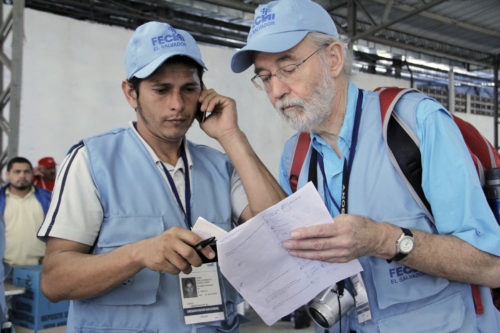
Carlos Duran Flores, a national observer, and David James of Grace Church of West Lorne, Ontario, phone in the first of three reports from the voting station at San Martin. Photo: Lynette Wilson/Episcopal News Service
Editor’s note: On March 16, El Salvador’s electoral tribunal proclaimed Salvador Sánchez Cerén as the winner of the presidential elections. Sánchez Cerén, of the Farabundo Marti National Liberation Front (FMLN), received 50.1 percent of the votes, while his opponent Norman Quijano, of the Nationalist Republican Alliance, or ARENA, received 49.9 percent.
[Episcopal News Service – San Salvador, El Salvador] By 5 a.m. on Feb. 2, international and national election observers began arriving at voting stations, two hours before the start of El Salvador’s presidential elections.
Their job was to keep watch: to attend the unpacking and cataloging of the election packets and the setup of the voting stations; impartially to observe voters casting ballots throughout the day, vigilant for signs of irregularity, evidence of fraud or misconduct, or citizens being denied their vote.
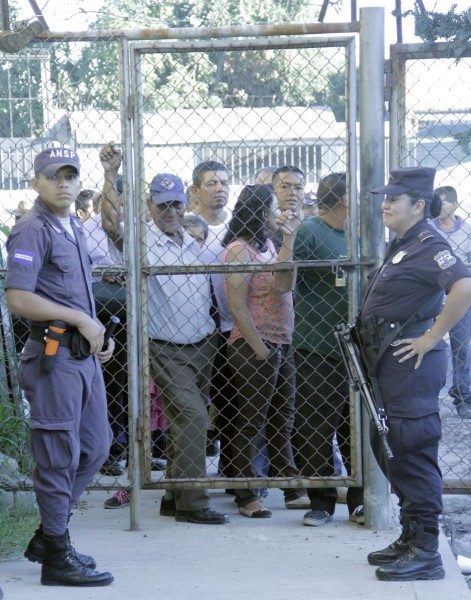
Votantes esperan de pie ante la puerta del centro de votación de San Martín después de las 7:00 A.M. hora en que comenzaban las elecciones.
At 7:35 a.m., as the National Police held voters outside the gate at San Martin, a municipality located a 25-minute drive east of San Salvador, David James, an Anglican observer from Canada, and Carlos Duran Flores, a national observer, called in the first of three reports they were required to file throughout the 14-plus-hour day. The report included the fact that one of the center’s nine voting stations hadn’t received its election packet until after 6:30 a.m., delaying the opening of the polls — a common observation across voting centers countrywide.
Besides the late start, a bit of confusion and an overall sense that some election workers were ill-trained, “things seemed to be going reasonably well,” said James, speaking just after 7 a.m. from his post in San Martin.
To win in the first round of elections, the president and vice president needed 50 percent of the vote, plus one vote. As of Feb. 3 in the evening, the two major parties, the left-leaning Farabundo Martí National Liberation Front, or FMLN, and the right-leaning Nationalist Republican Alliance, or ARENA, had received 48.93 and 38.95 percent of the vote, respectively. El Salvador’s electoral tribunal plans to release official figures on Feb. 5. A runoff likely will occur on March 9. The next five-year presidential term begins on June 1.
El Salvador’s electorate votes for a party by paper ballot. At the close of the polls, election workers representing the ARENA, FMLN and UNIDAD parties, counted the ballots. Each individual voting station handled up to 500 voters. At 7 p.m., when observers filed their third report, some stations still were counting.
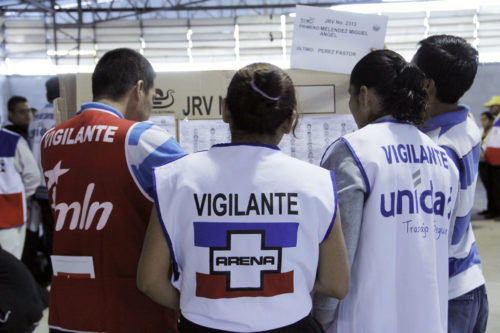
Three vigilantes, or “watchmen,” representing each of three major political parties served at each individual voting station, in addition to the election workers. Photo: Lynette Wilson/Episcopal News Service
Included among some 3,000 international and national election observers, 26 Anglicans from Canada arrived in El Salvador on Jan. 29. They came in advance of the election to gain a better understanding of the country’s electoral process by participating in a Foundation Cristosal Global School course providing historical context and perspective on the building of democracy in a post-conflict society, and to learn about their observer responsibilities. Foundation Cristosal is a San Salvador-based human rights and community development organization.
“I think it’s been going really, really well so far. I’m glad to be part of a group that is behaving professionally and taking the task very seriously,” said Olivia Amadon, global school coordinator, after the polls closed and final reports were filed.
This year, the local ecumenical chapter of the Latin America Council of Churches, or FECLAI, which has 20 years of election observer experience in El Salvador, and Cristosal participated in a National Observation Network. It is using statistical data about election observations to create a report tracking anomalies and to provide a statistically accurate sample of the voting-station counts that can be compared alongside official electoral tribunal accounts to verify accuracy.
“That’s something that is really important because, for instance, I was in Honduras recently, and we saw a lot of anomalies in the elections there,” Amadon said. “We saw a lot of vote-buying, voter intimidation, acts of violence, people getting kidnapped so they couldn’t join the voting tables … but in the end, the biggest fraud actually happened on the part of the electoral tribunal.”
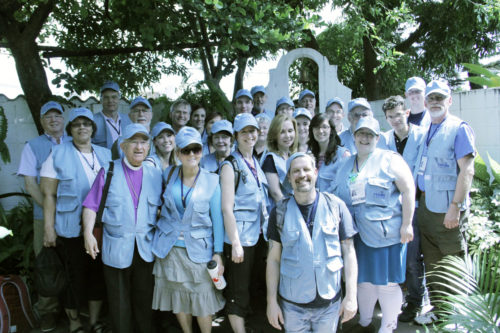
A delegation of Anglican-Episcopal election observers from Canada and the United States traveled to El Salvador to help ensure the transparency and legitimacy of the Feb. 2 presidential elections. Photo: Lynette Wilson/Episcopal News Service
In Honduras, the electoral tribunal’s vote count didn’t match the election workers’ count. Both major candidates claimed victory. The country swore in conservative Juan Orlando Hernandez as president on Jan. 27.
“I think that speaks to the importance of election observation: verifying and legitimizing election results because these institutions are still very young and have their own weaknesses,” Amadon added. “Democracy in El Salvador has only been around for 20 years; it’s still very young, and after what I’ve seen today, it’s probably one of the most successful election processes that I’ve ever seen.”
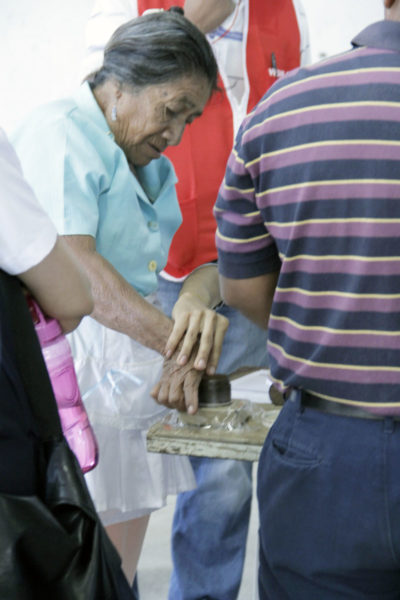
A woman dips her finger in paint after casting her vote in El Salvador’s Feb. 2 presidential elections. Sears offered a 20 percent discount for voters with paint-stained fingers on Feb. 2 Photo: Lynette Wilson/Episcopal News Service
Fraud, corruption and voter irregularity often have gone hand-in-hand with elections in Latin America. But in the immediate aftermath of the Feb. 2 elections, both the observers and the media described the El Salvador voting as “tranquil” and “ordered.”
Civil war
From 1980-1992, El Salvador suffered a brutal civil war fought between its U.S.-backed, military led-government and a coalition of guerrilla groups, organized as the FMLN, which later became a political party. The war was fueled mostly by the gross inequalities that existed between a small group of wealthy elites who controlled the government and the economy and the majority of the population that lived in extreme poverty.
“The church went with the people because it can’t serve two masters,” said Diocese of El Salvador Bishop Martín Barahona during a Jan. 30 welcoming of the observer delegation.
“The U.S. government supported the government and the military, but the people in the United States supported the people, as did the Episcopal Church.”
The revolution that began in El Salvador in 1980 as an armed struggle continues today as civic society and human rights and social justice organizations work to build, educate and empower the country’s citizenry, according to civic and human rights organizations.
When the war started, the church decided to join the revolution; the bishop is the bishop of the people, Barahona said. That is why it’s important to keep working for a functioning democracy, “and that is why you are here as observers,” he said. “Because we ask people to testify to what is working and what isn’t … no human model is perfect, but we have to keep working at it.”
The solidarity movement in El Salvador had its beginnings in the Second Vatican Council. During the civil war, Roman Catholic and historic Protestant churches played a major role in exposing human rights violations including mass murders and forced disappearances.
“The churches’ effort in bringing these violations to light is what prevented an escalation of violence in El Salvador,” said Noah Bullock, Foundation Cristosal executive director. “So those relationships of solidarity mattered, and they continue to matter today as the country continues to struggle as a democracy.”
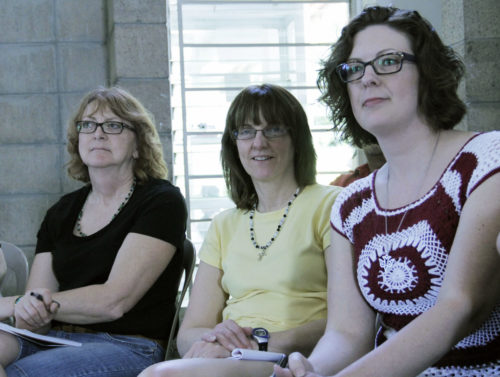
Angela Smith, right, and six other election observers from the Episcopal Diocese of Chicago traveled to El Salvador for the Feb. 2 presidential elections. Photo: Lynette Wilson/Episcopal News Service
The day before the elections, observers, including the group from the Anglican Church of Canada and seven Episcopalians from the Diocese of Chicago, gathered at San Juan Evangelista, an Anglican-Episcopal Church in San Salvador that during the war served as a camp for internally displaced people. There, they learned about the country’s electoral context, past and present, and their role as observers, with respect to the law, nonintervention, neutrality, objectivity and impartiality. The training was coordinated by FECLAI and the ISD (the Social Initiative for Democracy).
The National Observation Network was composed of more than 20 churches and civil society organizations encompassing more than 1,100 international and national observers, half of the total. The partner organizations shared resources that allowed the network to conduct a systematic observation including reports and a statistical representation of total votes cast, a media campaign to inform the electorate and legal resources to make formal denouncements of any illegal activities.
El Salvador has held six “democratic and free” post-military-controlled elections, said Eduardo Escobar, who led the observer training on behalf of ISD.
“We’re still in the process of letting the dust settle and understanding democracy,” Escobar said. “Sometimes we take one step forward and two steps back, and sometimes we take a step to the side and stay the same.”
In 1931, the people of El Salvador elected by popular majority President Arturo Aranjo, who began implementing social programs. A year later, during a coup d’état, General Maximiliano Hernández Martínez became president. From 1932 to 1979, a military regime governed El Salvador – the president was a military figure serving a five- to-six-year term – in the fashion typical of Latin America’s hardline, rightist military governments aligned with the U.S. Government in its Cold War fight against communism.
Unlike in Nicaragua and the Dominican Republic, where a single president governed, sometimes for decades, regular “elections” in El Salvador gave the impression of democracy, though fraud persisted throughout the 1970s and in the elections held during the civil war.

Noah Bullock, executive director of Foundation Cristosal, and Saul Geller, an 84-year-old observer from Vancouver, British Columbia, go over one of three reports observers were expected to file at various stages of the election process. It was the second time Geller had traveled to El Salvador to observe elections. The first time was in 2009 for municipal elections. Photo: Lynette Wilson/Episcopal News Service
Recent elections have been characterized as imperfect but substantially improved, said Bullock.
The FMLN won the presidency for the first time in 2009, and there has been a lot of speculation in the media surrounding what a second win for the FMLN would mean; speculation that has included fear-mongering both locally and internationally.
“A victory and second consecutive administration for the FMLN would be an affirmation of the left’s social programs and policy agenda and would be an opportunity to deepen that agenda with a greater mandate from the electorate,” said Bullock. “Because the election is likely to go into a second round, the addition of a third contender in the UNIDAD party signifies that in order to govern either the FMLN or ARENA will have to negotiate alliances.
“In theory, this type of check is good for democratic governance. In reality, the quality of the political offering is not much improved by UNIDAD. The campaign has been more of competition between populist promises than a serious policy debate.”
Out of a field of five candidates, three dominated the presidential race: current Vice President Salvador Sánchez Cerén of the FMLN; San Salvador Mayor Norman Quijano of ARENA; and former ARENA President Antonio Saca, representing a coalition under the umbrella of UNIDAD. (El Salvador’s constitution prohibits presidents from serving consecutive terms; this election marked the first time a former president stood for election with a different party.)
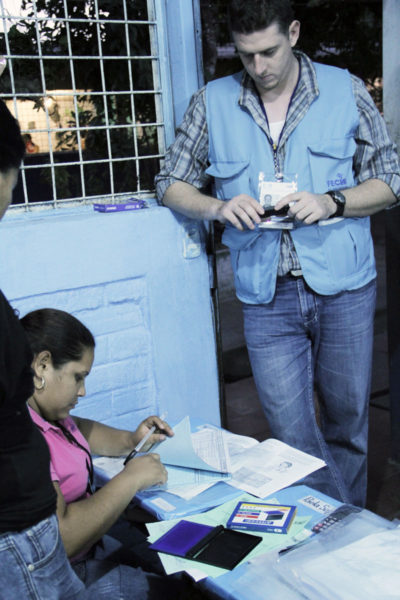
Chris Pilon, a seminarian at the Anglican seminary at Huron College in London, Ontario, oversees the final election paperwork at a voting center in an elementary school in Ilopango. Photo: Lynette Wilson/Episcopal News Service
Security and economic development top concerns
Security in a country that has been terrorized by gang violence related to global narcotics trafficking and crippled economic expansion were the topics of a Jan. 31 presidential forum attended by the election observers and the vice-presidential candidates at the Sheraton Hotel. The vice-presidential candidates representing the three major parties clarified their party platforms related to these issues in five-minute presentations, then answered three, identical questions related to security and economic development before taking questions from the audience.
Although election observers were to remain neutral and impartial, attending the forum allowed them to get a better understanding of the country’s everyday realities. Though it has dropped in the last year, the homicide rate in El Salvador is among the world’s highest. Most of the working population is unemployed, underemployed or working in the informal economy, and one in four families relies on remittances from relatives working abroad to pay monthly expenses. A majority of the estimated 2 million Salvadorans abroad live in the United States. Two of three Salvadorans who have gotten jobs in the last 30 years found them in the United States, according to the United Nations 2013 Development Report.
El Salvador is in its third year of a five-year U.S.-supported effort to enhance democracy, safety and economic growth through a Partnership for Growth Joint Country Action Plan that was signed in 2011, two years into the current Salvadoran administration.
Concerned that the United States might influence the elections, human rights and social justice groups joined forces in writing a series of letters to Secretary of State John Kerry and held press conferences asking the United States to take a neutral position. On Dec. 16, U.S. Ambassador Mari Carmen Aponte said the United States “would not be an actor” in the Feb. 2 elections.
Elliott Abrams, a deputy national security adviser in the George W. Bush administration and assistant secretary of state for inter-American affairs in the Ronald Reagan administration, weighed in in the Washington Post in support of El Salvador’s conservatives. The New York Times published an op-ed by William G. Walker, a retired career diplomat, who served as the United States ambassador to El Salvador from 1988 to 1992, in response to Abrams suggesting the left was not to be feared.
Changes to the voting system
There are 6.3 million Salvadorans living in 14 departments, or states, in a country the size of Massachusetts. As in the United States and Canada, voters must be at least 18 years old. And in El Salvador, they must present a valid photo ID, and the photo must match the photo alongside their name on the voter registration manifest posted at their designated voting station.
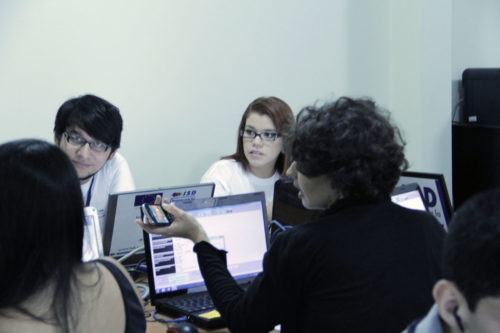
Volunteers work the phones at the headquarters of the Social Initiative for Democracy, taking calls from election observers filing reports and information for the rapid count that followed the close of the polls. Photo: Lynette Wilson/Episcopal News Service
Major changes in the electoral system took place in advance of the Feb. 2 elections. A residential voting system was implemented, whereby the country’s 4.8 million registered voters vote in their communities, rather than travel to regional voting centers organized alphabetically. This increased the number of voting centers from 460 to 1,591, with some 10,000 individual voting stations. And members of the Salvadoran diaspora, the majority living in the United States and Canada, were eligible to vote.
At a voting center in a soccer field in Soyapango, one of the most densely populated and dangerous municipalities in the country, observers said that despite a “general suspicion of the parties” the voting took on a festive air and that it was obvious that the people wanted transparency in the election process and their voices to be heard.
“They really believe their vote makes a difference; in Canada, we don’t see our vote as counting anymore,” said observer Anne Kessler, 21, a member of St. Mary’s Kerrisdale in Vancouver, British Columbia. “Maybe they are building a better democracy than we are.”
The day following the elections, in a press conference, FECLAI and the National Observation Network presented the results of the previous day’s work. Based on their data collection and observation, the leadership declared electoral fraud in El Salvador a thing of the past.
— Lynette Wilson is an editor and reporter for Episcopal News Service. She served as an election observer among the Anglican-Episcopal delegation.

Social Menu